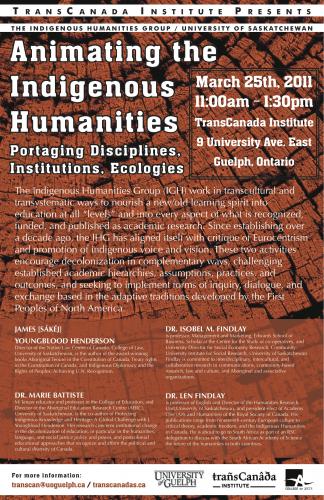The Indigenous Humanities Group
University of Saskatchewan: James [Sákéj] Youngblood Henderson, Marie Battiste, Isobel M. Findlay, Len Findlay, and Lynne Bell
Please click on the image below to download the event poster.

March 25th, 2011
11:00 am – 1:30 pm (Panel + Luncheon)
TransCanada Institute, 9 University Ave. East
Sample readings by the Indigenous Humanities group members (click title to download):
Law, Social Justice & Global Development by Isobel M. Findlay
Always Indigenize!: The Radical Humanities in the Postcolonial Canadian University by Len Findlay
In this presentation we will describe and demonstrate how in our Indigenous Humanities Group we work in transcultural and transystematic ways to nourish a new/old learning spirit into education at all “levels” and into every aspect of what is recognized, funded, and published as academic research. From its founding more than a decade ago, the IHG has aligned itself with critique of Eurocentrism and promotion of indigenous voice and vision. These two activities encourage decolonization in complementary ways, challenging established academic hierarchies, assumptions, practices, and outcomes, and seeking to implement forms of inquiry, dialogue, and exchange based in the adaptive traditions of the “teaching civilization” (Henderson) developed by the First Peoples of North America. We see our project as potentially of great benefit for the traditional humanities, but only if they admit to the causes of their current beleaguerment while opening themselves to more creative and more broadly beneficial collaboration across differences both residually colonial and brazenly neo-colonial.
Indigenous Humanities Group Members
James [SÁKÉJ] Youngblood Henderson (pronounced saw-gage) is the director of the Native Law Centre of Canada at the College of Law, University of Saskatchewan. He was born to the Bear Clan of the Chickasaw Nation in 1944 and is married to Marie Battise, a Mi’kmaw educator. He received a Juris doctorate in law from Harvard Law School (1974). He served as a constitutional advisor for the Mi’kmaw nation and the Assembly of First Nations (1978-1983). He advocates uniting treaty federalism with provincial federalism to create a shared rule, democracy, and government in Canada in “ Empowering Treaty Federalism.†He was one of the strategists that created Indigenous diplomacy, working through the Four Direction Council, an NGO, in the UN system and part of the drafting team of many of the existing documents. His award winning books are on Aboriginal Tenure in the Constitution of Canada, Treaty rights in the Constitution of Canada, and Indigenous Diplomacy and the Rights of Peoples: Achieving U.N. Recognition. He was awarded the Indigenous Peoples’ Counsel (2005) and the National Aboriginal Achievement Award for Law and Justice (2006), and an Honorary Doctorate of Laws, Carlton University (2007).
Dr. Marie Battiste, a Mi’kmaw educator from Potlo’ tek First Nations, Nova Scotia, is a full professor in the College of Education, and Director of the Aboriginal Education Research Centre (AERC) at the University of Saskatchewan. Her research interests are in initiating institutional change in the decolonization of education, in particular humanities, language, and social justice policy and power, and postcolonial educational approaches that recognize and affirm the political and cultural diversity of Canada. She is leader of a national hub at the University of Saskatchewan for the Canadian Prevention Science Cluster aimed at identifying approaches to culturally appropriate school-based violence prevention and also leads the Animating Indigenous Humanities project, both funded by SSHRC. She is involved in the ethical protection and advancement of Indigenous knowledge, co-authoring Protecting Indigenous Knowledge and Heritage: A Global Challenge with J. Youngblood Henderson (Saskatoon: Purich Press, 2000), which received a Saskatchewan Book Award in 2000. She has published widely, journals and books, including editing Reclaiming Indigenous Voice and Vision (Vancouver: UBC Press, 2000); co-editing a special edition of the Australian Journal of Indigenous Education (May 2005), and serving as senior editor with Jean Barman for First Nations Education in Canada: The Circle Unfolds (Vancouver: UBC Press).
Dr. Isobel M. Findlay is an associate professor, Management and Marketing, Edwards School of Business, Scholar at the Centre for the Study of co-operatives, and University Director for Social Economy Research, Community-University Institute for Social Research, University of Saskatchewan. Committed to interdisciplinary, intercultural, and collaborative research, she teaches and has published widely in communications, cultures, and communities; community-based research; law and culture; Aboriginal and associative organizations; and partnerships, governance, performance indicators and reporting standards. Isobel works closely with community groups designing and conducting research to promote and support community economic development, social justice, and environmental sustainability.
Dr. Lynn Bell is a professor of Art and Art History and Co-Director of the Humanities Research Unit at the University of Saskatchewan. Trained as a mediaevalist and then as a nineteenth-century specialist, she has for the past two decades shifted her research and teaching practice to the vast accumulation of decolonizing work developed by visual artists to address the continuing forms and effects of colonial consciousness in Canadian society. This work has taken public form in curated exhibitions, essays, published interviews, exhibition catalogues, academic conferences, collaborative research, and courses taught in the interdisciplinary field of visual culture.
Dr. Len Findlay is professor of English and Director of the Humanities Research Unit at the University of Saskatchewan, and president-elect of Academy One (Arts and Humanities) of the Royal Society of Canada. His publications range from nineteenth-century European culture to critical theory, academic freedom, and the Indigenous Humanities in Canada. He is about to go to South Africa as part of an RSC delegation to discuss with the South African Academy of Science the future of the humanities in both countries.